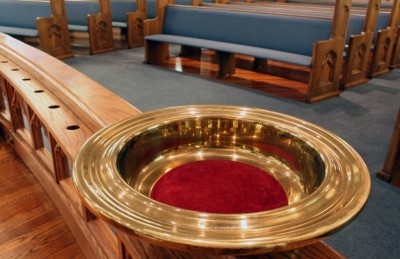Christians are only giving at 2.5 percent per capita,
while during the Great Depression they gave at a 3.3 percent rate.
—Mike Holmes, “What Would Happen if the Church Tithed?” (2013)
The Bible sets forth tithing as the principal means of financing the kingdom of God.
—James Jordan, The Law of the Covenant (1984)
Robbing God
 Nehemiah had returned to the Persian capital for a brief time. Upon his return to Jerusalem, he found that there were new problems (Neh. 13). One of the chief was that the Levites hadn’t been paid. These were the men who ministered in the Word of God and music. With no income, the Levites had abandoned their ministry and gone back to their fields to make a living as best they could.
Nehemiah had returned to the Persian capital for a brief time. Upon his return to Jerusalem, he found that there were new problems (Neh. 13). One of the chief was that the Levites hadn’t been paid. These were the men who ministered in the Word of God and music. With no income, the Levites had abandoned their ministry and gone back to their fields to make a living as best they could.
Nehemiah confronted the rulers and asked rhetorically, “Why is the house of God forsaken?” The rulers had nothing to say. There was nothing to say. There was no imaginable excuse for a failure to pay God His tithe, the 10 percent income tax that financed the work of the Levites.
About the same time that Nehemiah was putting teeth into these reforms, the prophet Malachi denounced Israel for her half-hearted, cavalier approach to worship. He, too, zeroed in on the tithe. He called failure to tithe “robbing God.” Speaking on God’s behalf, he wrote:
“Will a man rob God? Yet you have robbed Me! But you say, ‘In what way have we robbed You?’ In tithes and offerings” (Mal. 3:8, NKJV).
Malachi insisted that result of this robbery was a curse on the whole nation. Israel’s fields and crops were suffering wide-scale destruction. Famine was at hand. Only repentance would turn this agricultural crisis around:
Bring the full tithe into the storehouse, that there may be food in my house. And thereby put me to the test, says the LORD of hosts, if I will not open the windows of heaven for you and pour down for you a blessing until there is no more need (Mal. 3:10, ESV).
The Patriarchs and Tithing
In Scripture, the first mention of the tithe comes in Genesis 14. Abraham has just fought a war against a coalition of invading Mesopotamian kings and came away victorious with more than a little “spoil.” On his return he meets a marvelous character, one Melchizedek, the priest-king of Salem, the future Jerusalem. Melchizedek brings forth bread and wine to Abraham and his men and blesses Abraham in the name of God most high. And then we are told, “And Abraham gave him tithes of all” — that is, he gave Melchizedek a 10th of the spoils he had just gained.
The next biblical account of tithing appears in Genesis 28. Jacob, Abraham’s grandson, is on his way into Syria to find a wife. But before he leaves the boundaries of the Promised Land, he has a dream. He sees a ladder reaching to heaven, and on it, angels ascending and descending. From the top of the ladder, from heaven, God makes Jacob great promises concerning the land and his seed. Upon waking, Jacob is afraid. He names the place Beth-El, the house of God, and he promises that upon his safe return he will surely give God a 10th of all that he has gained.
Some initial observations are in order: The tithe obviously antedates the Mosaic Law. It even antedates the Abrahamic covenant (Genesis 15 and 17). It is a 10 percent tax on one’s increase. It ought to be given for God’s house and to the “priests” who are doing God’s work. It is an acknowledgement of God’s final and total ownership of all that the believer has.
Tithing in the Mosaic Law
Though the Patriarchs practiced tithing long before Moses, the Mosaic economy took up tithing, expanded on it, and integrated it into Levitical/tabernacle worship. The other tribes were to pay their tithes to the Levites, who either served in the Tabernacle or were scattered through Israel as teachers of the Word and experts on the law (Num. 18:18-24). The Levites in turn tithed on what they received and gave it to the Levitical priests who served in the Tabernacle or, later, in the Temple (vv. 25-32). The basic function of the Mosaic tithe, then, was the support of the House of God and those who ministered the Word of God.
A second tithe, or perhaps a partial use of the basic tithe, paid for the celebration of Israel’s final harvest festival, the Feast of Tabernacles. God encouraged and ordered His people to celebrate His blessings in His presence (Deut. 12:5-19; 14:22-27). So communal celebration of God’s mercies can be a proper use of the tithe.
And, every third year Israel gave tithes for the poor in their local communities (Deut. 14:28-29). Some see this as an additional third-year tithe; others, as an every-third-year redirection of the basic tithe. In either case, it seems clear that care for the deserving poor could also be a proper use of the tithe.
Tithing under the New Covenant
 Christ commended tithing to His disciples (Matt. 23:23), but this was before the Cross, and many Christians assume that tithing belonged exclusively to the older covenants … that the giving under the New Covenant is governed by one’s feelings.
Christ commended tithing to His disciples (Matt. 23:23), but this was before the Cross, and many Christians assume that tithing belonged exclusively to the older covenants … that the giving under the New Covenant is governed by one’s feelings.
But to understand the New Covenant perspective properly we must look again at Abraham and Melchizedek, this time with the writer of Hebrews as our guide. In chapter 7 of that book the writer discusses Melchizedek at some length. He points out that Melchizedek was clearly greater than Abraham. The evidence is that Melchizedek blessed Abraham, not the other way around, and that Abraham paid tithes to Melchizedek (vv. 4-7).
Even more, since Levi and all his descendants were still “in the loins” of Abraham, all the Levites representatively paid tithes to Melchizedek through their ancestor (vv. 9-10). So the writer concludes that Melchizedek’s priesthood was much greater than the Levitical priesthood established by the Mosaic law. He further argues from Psalm 110 that Jesus Christ is “a priest forever after the order of Melchizedek” (vv. 11-22; cf. Ps. 110:1-4). That is, Christ’s priesthood is of the same sort as Melchizedek’s, and represents the priesthood of the New Covenant.
With regard to tithing, then, the argument is simple. Abraham, the father of all who believe, paid tithes to Melchizedek, the priest-king of (Jeru-)Salem; therefore, we, his spiritual children, ought to imitate him and pay tithes to our “Melchizedek,” the Priest-King of the New Jerusalem. This means we ought to pay tithes to Jesus Christ for the support of His House, His Church and especially His kingdom. This isn’t legalism, but is a simple analogy of faith.
The Tithe and Blessing
Deuteronomy 8:18 says that God gives His people the power to get wealth “that He may establish His covenant.” Scripture is clear that the continuation and spread of God’s covenant and Kingdom is to be funded by God’s people. God blesses His people with wealth so that they can further His Kingdom.
In simple terms, pastors have to be paid; the godly poor have to be clothed and fed; Bibles and gospel literature have to be printed; mission projects have to be funded. The Church has a commission. And God’s people have to foot the bill.
When God’s people choose … even in the name of a deeper spirituality … to withhold their tithes, God promises to withhold His blessings. When they are faithful, He promises positive sanctions. He promises to open the windows of heaven in material blessing. But God is always more concerned about His people’s sanctification, their growth in grace, than He is about their wealth and comfort. His blessings come in terms of His own measure, schedule and time. Tithing isn’t a way to force His hand or buy His grace.
Conclusion
The tithe is God’s income tax, a basic acknowledgement of God’s sovereignty and His absolute title to all that we have. But Malachi says that Israel had robbed God in tithes and offerings. God expects His people to give generously to the work of the Gospel and Kingdom, not as a matter of coercion but of gratitude and joy (2 Cor. 8—9). After all, God gave His Son for us.
God’s tithe may seem harsh and oppressive, but it’s a small matter compared to the demands of the welfare state we live in. I guess the inevitable alternative to God’s tithe is the confiscatory tax system of our messianic nanny-state (1 Sam. 8:10-18). The alternative to a Biblically based, tithe-supported system is the bloated and failing monstrosity we endure today. The alternative to financing the Kingdom of God is financing the kingdom of man.
